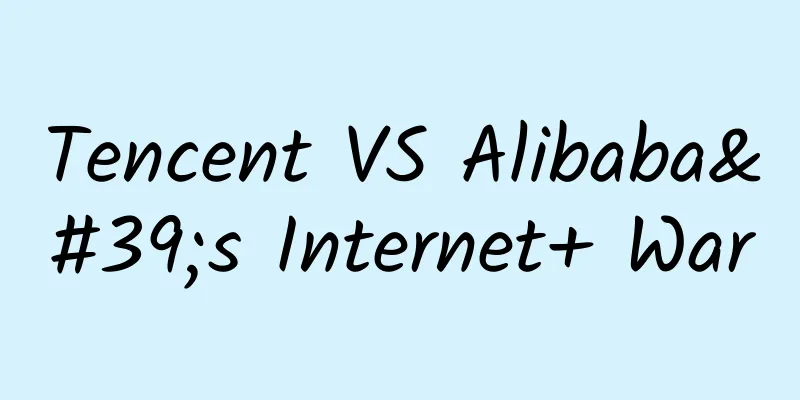Tencent VS Alibaba's Internet+ War

|
Internet+, this term has recently appeared frequently in reports of major media. In March this year, the government report formally proposed the formulation of an "Internet+" action plan: to promote the integration of mobile Internet, cloud computing, big data, the Internet of Things and other technologies with modern manufacturing, to promote the healthy development of e-commerce, industrial Internet and Internet finance, and to guide Internet companies to expand into the international market. This is an unprecedented height. Literally, we can think of Internet+ as using the Internet to combine traditional industries and create a new ecology in new fields. This ecology is based on the characteristics of the Internet itself, such as borderlessness, freedom, equality, openness, cooperation, free, and interaction. The result of the traditional field and the Internet is naturally not a simple addition of the two, but a compound reaction. The result brought by Internet+ will be based on the characteristics of the Internet, driving the changes in the industry, and rapidly developing the economy. Internet+ is an inevitable choice for China's economic development Since 2006, China's economic trend has experienced some fluctuations. As a pillar industry in the past, real estate has brought benefits to the development of national strength, but also brought disadvantages, because real estate radiates many industries, such as steel, cement, building materials and other industries, and also includes many employment issues. The real estate problem is also a typical economic problem. Judging from the results of the government's administrative regulation in 2006, 2008, 2010 and 2015, housing prices have been controlled to a certain extent, but such a pillar industry is bound to face industrial reform due to changes in national conditions. In contrast, since the Internet, which was first positioned as China's information superhighway, entered China, it has gradually embodied important economic and cultural values from its earliest entertainment attributes and information hull. Based on Internet technology, it has improved the efficiency of the industry and changed the business model of related industries. Based on China's population size and "Made in China" in the context of a major country, the in-depth integration of the Internet and the industry based on Internet+ has broken and re-integrated possible boundaries, creating a new economic growth point for China. At present, the Internet is naturally the best carrier. On the one hand, it will not cause any serious damage, and on the other hand, it will promote the original industry. Internet+ is a trial run for government management or cloud management We have been evolving. In the Stone Age, primitive humans used sticks and sharp stone tools, learned to control the fire they once feared, and ate cooked food, which extended their lifespans over the course of history and gave them a chance to become the actual controllers of the world. In the 20th century, we had another opportunity, which was the comprehensive upgrade of Chinese Internet applications brought about by Internet+. "Internet Plus" Action Plan: Promote the integration of mobile Internet, cloud computing, big data, the Internet of Things, etc. with modern manufacturing. From this level of understanding: cloud computing, big data, the Internet of Things, etc., will inevitably lead to a high degree of data concentration and resource concentration. On the other hand, they represent sharing and information security. Under such a structure, the advantages of resource intensiveness are more obvious, which is also in line with national policies. Recently, AutoNavi held a press conference for its public transportation information platform. AutoNavi announced that it will launch the "AutoNavi Public Transportation Information Platform" in cooperation with government transportation management departments in eight cities, including Beijing and Guangzhou, to provide traffic information analysis such as "city traffic jam rankings", "traffic conditions in hot business districts", and "traffic jam anomaly detection". Indeed, the launch of the AutoNavi Traffic Information Public Service Platform is a practical example of the transformation and upgrading of public services, and also a rapid implementation of the "Internet +" concept. According to the information revealed at the press conference, Amap, which has more than 300 million users, is building a massive amount of traffic information service data. From a data perspective, the traffic data processed each month has exceeded 10 billion, and more than 700,000 traffic information events are shared each month. More than 110 cities across the country have generated this massive amount of data. The data comes from taxi and logistics vehicles in cooperation with the government, but more than 50% of the data comes from mobile Internet travel data. From 2012 to 2014, Internet data accounted for more than 50%, and after 2015, the amount of data has been increasing at a rate of several tens of percent every month. In fact, through this Internet model, Amap has effectively solved the mode of traffic data collection. Congestion has always been a chronic problem in cities, especially in densely populated cities. Drivers can only rely on radio traffic information to get a rough idea of the situation every day. This information is somewhat delayed and inaccurate. Based on big data cloud computing, cooperation with the government can not only obtain real-time traffic information, but government departments can also use this data platform, combined with intelligent traffic control systems, to conduct reasonable traffic light management and effectively alleviate and control traffic congestion. From this perspective, Internet+ uses technological means to effectively assist the government in managing the city. The road condition information platform is probably just a trial. Let us imagine that if every city has a similar government cloud management center, the government's management and services will be of better quality. BAT's layout of Internet + Smart City's genetic attributes are very important The efforts of the Alibaba system are completely different from those of Tencent, another company that also advocates smart cities. Alibaba, with its e-commerce attributes as its genes, was the first to complete the layout of small and medium-sized businesses based in China. It is obvious that Alibaba, with its leading e-commerce revenue data, is subtly affecting the real economy, such as the decline of traditional shopping malls. The combination of Internet+ actions is also more direct. Due to the deep integration with traditional enterprises in advance, the public service platform released by AutoNavi Maps this time is also showing its potential, directly serving the government and enterprises, more directly, without the need for packaging and media hype. Due to its e-commerce nature, Alibaba is more direct in combining with traditional industries and has its own traffic portals, such as Alipay Wallet, Taobao Mobile App, and the often-overlooked Weibo platform. These three platforms effectively solved Alibaba's traffic problem in the mobile Internet era and are excellent portals. Because they are all direct lines, the interconnection and use of data has formed a new three-in-one pattern, that is, three portals and one platform. If the Internet is viewed as a platform, or as a basic facility, it will gradually penetrate into every part of the industry and the entire society. For example, in marketing, retail, manufacturing, financial logistics, government affairs, and public services, then Alibaba's layout is as follows: Taobao and Tmall solve e-commerce problems; Ant Financial solves Internet finance and urban public services; Cainiao Network solves logistics problems; Alipay provides payment platform support; Alibaba Cloud is the entire technical support, and the advantages of Alibaba with commercial attribute genes are more obvious. Open any of the three platforms, and you can complete all aspects related to your life consumption, from water, electricity, coal, broadband payment, hospital registration, social security payment, car violation handling, O2O localized life services, supermarket shopping and other life scenarios, Alibaba can solve them and truly form smart city applications. The most important thing is that Alibaba's e-commerce genes have cultivated the usage habits of Chinese users, and it has obvious advantages in competition. Obviously, Tencent and Alibaba are on different paths and will not face the most direct conflict. In contrast, Tencent's Internet+ path is similar to Alibaba in every way, which is also related to Tencent's own development characteristics. The "imitation and plagiarism" criticized by the industry in the early days is also revealed. For example, Alibaba has Tmall, Tencent has Yixun, Alibaba has Alipay, and Tencent has Tenpay. However, based on Tencent's main entertainment attribute gene, the gap is still a chasm. According to the data released by iResearch in March this year, as of the end of last year, Alipay accounted for 82.3% of the market share of China's third-party mobile payment transaction volume in 2014. Such a number is not so easy for Tencent to face. Tencent's advantage based on WeChat's traffic entrance is also its disadvantage. Because of its strong social genes, WeChat will not be too heavy. In comparison, Alibaba has its own three direct traffic entrances. Under the diversified service needs of Internet+, facing the government, enterprises, users, and merchants, Tencent is in urgent need of multiple traffic entrances and independent product support. The portal plus WeChat method chosen by current smart city projects does not have a clear advantage. The portal traffic entrance advantage is scarce, WeChat's traffic conversion rate is not high, and user habits have not yet been formed. Looking at the competition of the Internet+ ecological strategy among the three BATs, from the results, the beachhead battle between Alibaba and Penguin has just begun. Alibaba has a huge business chain in the entire industry, especially the traditional industries based on downstream businesses. Before its listing, Alibaba acquired a large number of upstream Internet companies, including UC and AutoNavi. Although Tencent also acquired some companies with similar attributes, it is difficult to form a perfect Internet+ structure due to different natural genes. On the contrary, Alibaba's advantage in the competition is already very obvious. If Tencent wants to regain lost ground, it will not be able to get an advantage by relying on such close combat. |
<<: Is this a big lie or a wise saying for developers?
>>: A simple implementation method of "callback feature" under Cocos2d-x3.5
Recommend
How much money is appropriate to invest in WeChat promotion? How is it charged? What types of promotions are there?
Recently, fans often ask me, how much money is ap...
How to effectively promote the product in the early stage?
"Successfully executing a plan that makes no...
How to analyze retention data and reduce user churn?
As we enter the second half of the Internet era, ...
How many keyword statuses are there in Baidu bidding promotion? What do they represent respectively?
The establishment of a Baidu bidding promotion ac...
iOS 15 beta 3 new features summary: Safari continues to improve
Apple today released the third beta of iOS 15 and...
WeChat Speaking Skills Mini Program Function, How much does it cost to develop a Chat Talk Mini Program?
Some time ago, a customer consulted the editor and...
Which self-media platform is the best? 2018 self-media platform recommendation
In the past 2017, the self-media industry has ach...
The secret of the top brands
Let’s start with a scenario: When you are tired, ...
How to increase the check-in rate of community users?
For most training camps, punch-in rate is a metri...
Centimeters Footprint Sunqiao: Create quality outsourcing with freelancers
"Internet +" has transformed and influe...
Marketing strategy for e-commerce operations promotion!
A netizen has such a case: If you buy a box of mi...
How to set shadows through View
Starting from Android 5.0 (API level 21), View pr...
In 3 minutes, you can learn about all advertising resources in iQiyi’s information flow!
The latest data from iResearch MUT in April shows...
Mailbox Master Christmas event attracts thousands of people, three lines of letters are full of love
Recently, Mailmaster and Costa jointly launched t...
Watch brand ranking and price: Four important features of website SEO optimization model recommendation
The first feature is the popularity feature, whic...









